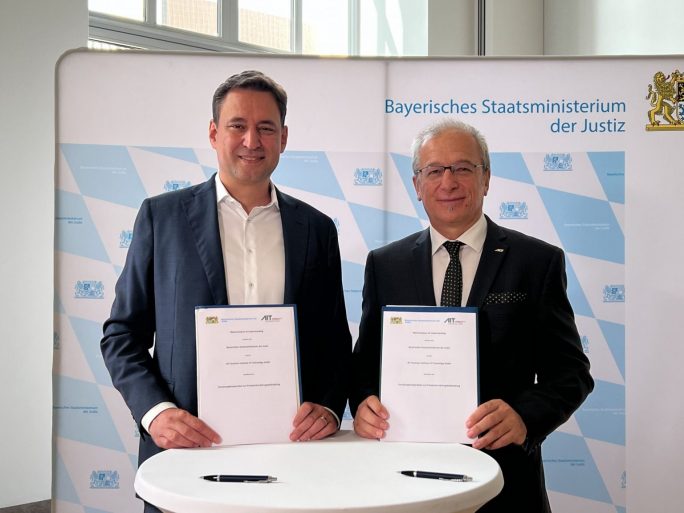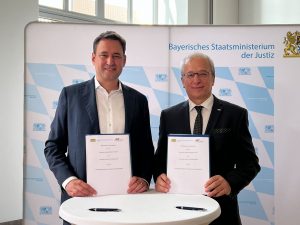Bavaria Cooperates with Top Austrian Research to Protect End Customers From Fake Stores

Disinfectants in the pandemic, e-bikes in the summer, firewood in the energy crisis,toys before Christmas: Fake stores develop according to trends and lure with deceptively genuine and serious-looking offers on the Internet at bargain prices. Those who order there wait in vain for the goods they have paid for.
In order to put Bavaria in an even better position in the fight against online fraud, Bavaria’s Minister of Justice Georg Eisenreich signed a cooperation agreement last August together with Dr. Helmut Leopold, Head of Center for Digital Safety & Security at the AIT Austrian Institute ofTechnology in Vienna, at the Palace of Justice in Munich. The aim of the cooperation is to equip the Cybercrime Central Office Bavaria (ZCB) even better for investigations on the Internet with the AI-based FakeShop Detector.
Justice Minister Eisenreich: “Fake stores have become a real internet plague. In a single investigation complex conducted at the ZCB alone, around 1,600 aggrieved parties were defrauded of around 500,000 euros. The stores appear on the Internet and usually disappear again as soon as the fraud is discovered. Together with the Austrian specialists, we want to tailor the successful Fake Shop Detector to the special requirements of law enforcement agencies and develop it further.”

What can the Fake-Shop Detector do
The tool was developed by AIT, Austria’s largest non-university research institution, in close cooperation with the Austrian Institute for Applied Telecommunications (ÖIAT) and the Austrian IT solution provider X-Net. The Fake-Shop Detector (https://www.fakeshop.at/) emerged from several Austrian security research projects (e.g. SINDBAD, RIO) and was financed by funds from the Austrian Federal Ministry of Finance and the Ministry of Agriculture, Regions and Tourism in the KIRAS funding scheme. The aim is to use artificial intelligence to check unknown online stores in real time against more than 21,000 features. If a store is suspicious, the Detector warns. Eisenreich: “For ZCB’s investigations, access to domains and servers as early as possible is crucial.

The use of the Fake Shop Detector offers considerable potential for identifying fake stores at an early stage with the help of artificial intelligence. This gives investigators a valuable head start. The tool could also help the Bavarian Cybercrime Center (ZCB) to better identify the structures behind the crimes and make its investigations in this area of crime even more efficient. Recently, our specialists have seen a rise in organized criminal groups engaging in fake store operations.
Threats require more joint efforts
Dr. Helmut Leopold, Head of Center for Digital Safety & Security at AIT: “Through an exemplary close cooperation of data scientists and domain experts, an effective AI tool with real added value for humans in the digital space could be developed with the Fake Shop Detector. Above all, permanent quality control of the AI by humans is an inherent part of the AI-based solution. The growing threats of disinformation, hate speech and fraudulent attacks on the Internet require even more joint efforts to provide digital users with tools and resources to maintain their sovereignty.”
Nikolaus Dürk, founder and managing director of X-Net: “The excellent cooperation between AIT, ÖIAT and X-Net has laid the foundation for a top product that is enjoying increasing awareness in the German-speaking world. The cross-border cooperation and bundling of knowledge and resources now enables the creation of a sustainable Europe-wide product in a further step. The main goal is to reduce cybercrime in Europe through targeted preventive measures. The Fake-Shop Detector enables public authorities to provide their citizens with a secure and easy-to-use tool, thus preventing a weakening of the European purchasing power and damage to the European Economic Area by billions of Euros.
Bavarian Consumer Center offers Fake Shop Finder
While the Fake Shop Detector is being further developed for the special requirements of investigations, the Bavarian Consumer Center offers a Fake Shop Finder for consumers. The automatically generated blacklist warns of possible fraudsters on the Internet at www.fakeshopfinder.de.
Marion Zinkeler, director of the Bavarian Consumer Center: “With the Fakeshop-Finder of the consumer centers, users can check for themselves whether an online store is potentially fraudulent. With this preventive approach, our tool ideally complements the work of law enforcement agencies by preventing citizens from becoming victims in the first place.” The Fakeshop Finder has already been very well received. Marion Zinkeler on the figures: “Every day, an average of 3,800 Internet addresses are entered into the Fakeshop Finder and 2,300 new fakeshops are detected per month. We are thus making a significant contribution in the fight against this form of cybercrime.”
Search engine for the darknet
In the fight against online crime, the Bavarian judiciary relies on international cooperation and technical innovation. For example, the ZCB is also working with top Dutch researchers to develop the “Dark Web Monitor” – a kind of search engine for the darknet. Eisenreich: “With the Fake Shop Detector, the special prosecutors are getting another tool that is being developed to fit their needs.”
In addition to the successful German-Austrian cooperation, the team behind the Fake-Shop Detector is delighted to have won the IT Business Award eAward on 16.10.2023 in Vienna. The Fake-Shop Detector took first place in the category “Machine Learning and AI”! The eAward award makes a very significant contribution in further raising public awareness of the threats in e-commerce and promoting the spread of this important technology.
![]()
Fake Shop Detector Team © Gregor Hofbauer standing from left: Ross King (AIT), Lukas Ziegler (X-Net), Thomas Ruzicka (AIT), Nicholas Lamprecht (X-Net), Wolfgang Grabuschnig (AIT), Thorsten Behrens (ÖIAT), Michael Mürling (AIT), Bernhard Jungwirth (ÖIAT), Katharina Kloiber (X-Net), Helmut Leopold (AIT) seated from left: Wolfgang Eibner (X-Net), Louise Beltzung (ÖIAT), Andrew Lindley (AIT).
During the ITSA (Europe’s leading IT security fair) in Nuremberg, the Fake Shop Detector was presented at the joint booth of the Austrian Federal Economic Chamber. In addition, X-Net and AIT presented cybersecurity solutions in the field of Big Data Analysis, Cryptoasset Forensic, Quantum Computing Security, IT-/OT Security & Network Technology as well as individual hardware and software solutions under the title Sharing Innovation with other Austrian partner companies.